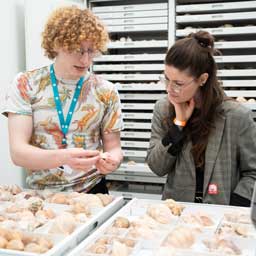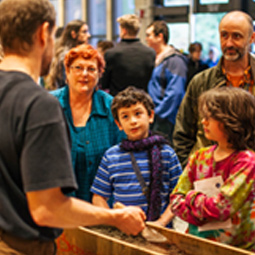Equity & Inclusion at the Burke
The Burke Museum’s mission is to care for and share natural and cultural collections so all people can learn, be inspired, generate knowledge, feel joy, and heal.
Our commitment to diversity, equity, and inclusion informs our efforts in achieving each of these goals. We believe that:
Diversity has many aspects. True realization of our mission requires accessible pathways to involvement and engagement for all members of our community, regardless—and in appreciation of— age, background, ethnicity, gender, sexual orientation, socioeconomic situation, religion, and ability.
Inclusion is crucial to our work now and into the future. Museums have long been isolated from the people they serve. Systemic exclusion rooted in a failure to understand and acknowledge multiple types of expertise has served as a barrier to the full participation of historically underrepresented groups. We strive to remove these barriers through regular consultation—asking questions, actively listening to the answers—with people and groups contributing a variety of voices and perspectives, to add new levels of meaning to our programming and deepen its relevance to the broader community.
Greater inclusion also lays the groundwork for a more just, representative tomorrow. When all people have the opportunity to see themselves and people like them both in the museum and engaged in its work, new possibilities open up. A more welcoming, accessible Burke fosters the imagination of the next generation of museum professionals and diversifies life choices more generally, by showing that careers in art, history, science, and beyond are available to all.
We have much to learn. We acknowledge that culturally diverse understandings of science and history exist side by side and enrich one another; there are multiple ways of knowing. This means that while the Burke has a great deal to offer through the collections and years of accumulated research and expertise, we also have much to learn from others.
To this end, we pledge to collaborate with Indigenous and other local and global partners in a respectful exchange of ideas and experiences, replacing what was too often experienced as a one-sided monologue with genuine dialogue.
Internally, this extends to thoughtful cooperation between those working in the cultural history and natural history areas of the Burke, with greater attention paid to how those disciplines—and the various subjects contained within—do not sit in counterpoint, but instead can be mutually illuminating.
The museum is a place to work for justice. The Burke Museum stands in solidarity with organizations fighting for racial, social, and environmental justice. Empathy demands that we name the pain, frustration, and overwhelming distress that Black, Brown, and other underserved communities experience. Inequities that harm some members of our community harm all members, and undermine the heart of the Burke’s mission to promote respect for diversity.
We commit to leveraging the privilege accrued to us by our position as the Washington state museum, part of a major public university, using the cultural and scientific collections in our care to engage in education, advocacy, and activism that will support and uplift all unheard and marginalized communities and we call on our network of peer institutions to do the same.
Diversity, equity, and inclusion have the power to heal. These values are a way to help repair damage done to communities by a colonial model of museums that for decades privileged collections, preservation, and research over cultural autonomy and community survival.
The Burke has committed to decolonization as a key institutional priority, and across the museum we now work as facilitators and stewards, not as gatekeepers and designated authorities; we are learning to step back and allow the relationship between community and collections to be primary.
Interacting with museum collections and displays can elicit strong, sometimes raw, emotions, particularly for those whose relationship to the museum involves trauma and displacement. We therefore offer cultural safety practices that prepare people for what they will see at the Burke, acknowledge the complexity of the experience, and make space for efforts to integrate these feelings.
Through patient, attentive relationship-building we hope to progress from collaboration to healing and ultimately, to find joy, strength, and resiliency for the museum and for all those we serve.
While we are confident in our values and eager for change, we realize that the aspirations laid out here are part of an imperfect, dynamic, living process. Decolonization in particular is an ongoing journey that requires intentional, consistent effort, rather than a destination to be reached. Authentic work in diversity, equity, and inclusion requires shifting our mindset, in ways that can be challenging and sometimes painful. We are grateful to all those who have chosen to walk this new path with us, and invite you to join us as well.
The University of Washington reaffirms its policy of equal opportunity regardless of race, color, creed, religion, national origin, sex, gender identity, sexual orientation, age, marital status, disability, or status as a protected veteran. This policy applies to all programs and facilities, including, but not limited to, admissions, educational programs, employment, and patient and hospital services. Any discriminatory action can be a cause for disciplinary action.

